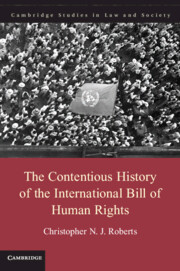Book contents
- Frontmatter
- Contents
- Preface
- Acknowledgments
- Introduction
- Chapter 1 What Are Human Rights and Where Do They Come from?
- Chapter 2 From War and Politics to Human Rights: The Cold War and Colonial Recession
- Chapter 3 Protecting State Sovereignty from the “Dangers” of Human Rights
- Chapter 4 Saving Empire: The Attempt to Create (Non)-Universal Human Rights
- Chapter 5 A Human Rights Treaty that Permits Lynching?
- Chapter 6 The United States’ Unequivocal Ambivalence toward Socioeconomic Rights
- Epilogue
- Index
- References
Chapter 2 - From War and Politics to Human Rights: The Cold War and Colonial Recession
Published online by Cambridge University Press: 05 November 2014
- Frontmatter
- Contents
- Preface
- Acknowledgments
- Introduction
- Chapter 1 What Are Human Rights and Where Do They Come from?
- Chapter 2 From War and Politics to Human Rights: The Cold War and Colonial Recession
- Chapter 3 Protecting State Sovereignty from the “Dangers” of Human Rights
- Chapter 4 Saving Empire: The Attempt to Create (Non)-Universal Human Rights
- Chapter 5 A Human Rights Treaty that Permits Lynching?
- Chapter 6 The United States’ Unequivocal Ambivalence toward Socioeconomic Rights
- Epilogue
- Index
- References
Summary
I
In 1945, when the war was in its final stages, the international community of states descended on San Francisco to institutionalize the wartime alliance of the United Nations. The fifty or so states at the UN’s founding conference represented a range of competing systems – capitalist, socialist, and imperialist, for example – and were now sitting shoulder to shoulder. Although depression and war challenged each of these systems in its own ways, they all remained significant forces during the UN’s most formative moments. As a result, there existed many competing visions about what kind of postwar world would best foster international peace and security. Would it be one in which capitalism triumphed over communism? Or perhaps peace would prevail in a world in which the colonial powers could reestablish the boundaries and dictates of their global dominions. Would racial difference continue to be a permissible parameter for arranging social hierarchy? Each of these alternatives for organizing social relations enjoyed great support from certain quarters while enduring bitter opposition from others.
Despite their differences, in the mid-1940s one of the clearest imperatives for the members of the new UN was the need to achieve some degree of unity among a vastly diverse set of political actors and social systems. If the nations of the world were to move forward from the tumult of total war, they would have to agree on a set of basic principles to govern the scope of their responsibilities and the limits of their powers. Though there was widespread consensus about the need for lasting international peace and security, what the necessary preconditions were – or in what kind of national or global social order they could be attained – became a matter of intense debate.
- Type
- Chapter
- Information
- Publisher: Cambridge University PressPrint publication year: 2014



